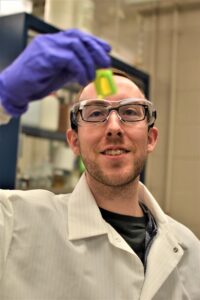Chester E. Markwalter

Enabling Biologics Encapsulation in Polymeric Nanocarriers: Technology Design from Process to Application
Summary
 The encapsulation of water-soluble therapeutics and biologics into nanocarriers to achieve novel therapeutic behavior has been envisioned for decades, but clinical translation has been hampered by complex production strategies. The methods that have been developed are not economically viable because each approach loads the therapeutic into the carrier inefficiently. To address this unmet need, this project has developed a scalable and efficient method to form polymeric nanocarriers encapsulating water-soluble therapeutics. Called “inverse Flash NanoPrecipitation,” the technique achieves biologic loadings (wt% of total formulation) that are 10 times higher than currently possible. This work has demonstrated the broad applicability of the process by formulating over a dozen different oligosaccharides, antibiotics, peptides, proteins, and RNA into nanocarriers on the order of 100 nm with high reproducibility. Model enzymes such as lysozyme and horseradish peroxidase have been shown to release from the nanocarriers with 99% retained activity in a sustained manner. In vivo tests of the nanocarrier, examining biodistribution of the constructs and demonstrating potency of the encapsulated therapeutic, are being carried out. These results demonstrate the potential for commercial implementation of this technology, enabling the translation of novel treatments in immunology, oncology, or enzyme therapies.
The encapsulation of water-soluble therapeutics and biologics into nanocarriers to achieve novel therapeutic behavior has been envisioned for decades, but clinical translation has been hampered by complex production strategies. The methods that have been developed are not economically viable because each approach loads the therapeutic into the carrier inefficiently. To address this unmet need, this project has developed a scalable and efficient method to form polymeric nanocarriers encapsulating water-soluble therapeutics. Called “inverse Flash NanoPrecipitation,” the technique achieves biologic loadings (wt% of total formulation) that are 10 times higher than currently possible. This work has demonstrated the broad applicability of the process by formulating over a dozen different oligosaccharides, antibiotics, peptides, proteins, and RNA into nanocarriers on the order of 100 nm with high reproducibility. Model enzymes such as lysozyme and horseradish peroxidase have been shown to release from the nanocarriers with 99% retained activity in a sustained manner. In vivo tests of the nanocarrier, examining biodistribution of the constructs and demonstrating potency of the encapsulated therapeutic, are being carried out. These results demonstrate the potential for commercial implementation of this technology, enabling the translation of novel treatments in immunology, oncology, or enzyme therapies.
The Predoctoral Fellowship in Pharmaceutics has given me the freedom to explore the promise of my project with greater focus. I can let the science lead towards exciting new avenues for application and commit to understanding process fundamentals that will help bring this new technique to the clinic. I am excited for the possibilities of my project and am grateful for the role the PhRMA Foundation has played in advancing it.